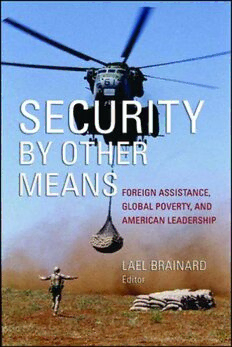
Security by Other Means: Foreign Assistance, Global Poverty, and American Leadership PDF
377 Pages·2007·1.848 MB·English
Most books are stored in the elastic cloud where traffic is expensive. For this reason, we have a limit on daily download.
Preview Security by Other Means: Foreign Assistance, Global Poverty, and American Leadership
Description:
In the face of unprecedented new global challenges, the hard power assets of the United States--military, economic or other means of coercion--are stretched thin. It has become increasingly critical for the United States to leverage foreign assistance and other soft power tools in order to grapple with global poverty, pandemics, and transnational threats. However, the country's fragmented, incoherent foreign assistance infrastructure has diminished the influence and overall effectiveness of these programs. While U.S. spending on foreign assistance has seen its greatest increase in forty years, the administration of foreign aid is dispersed among many agencies and branches of government in a manner that inhibits formulation and implementation of an effective strategy. Drawing on expertise from the full range of agencies whose policies affect foreign aid, Security by Other Means examines how foreign assistance furthers economic, security, humanitarian, and political interests. A joint study by the Brookings Institution and the Center for Strategic and International Studies, this assessment of the current structures of foreign assistance will be a solid resource for policymakers and stakeholders. It will serve as a critical catalyst for an informed debate on improving the effectiveness of U.S. foreign assistance, which will ultimately contribute to the overall well-being of citizens ensnared in poverty worldwide. Contributors: Owen Barder (Center for Global Development), Patrick Cronin (International Institute for Strategic Studies), Charles Flickner (former staff director, House Appropriations Subcommittee on Foreign Operations), Tarek Ghani (Center for Global Development), Steven Hansch (Georgetown University), J. Steven Morrison (Center for Strategic and International Studies), Larry Nowels (Congressional Research Service), and Steven Radelet (Center for Global Development).
See more
The list of books you might like
Most books are stored in the elastic cloud where traffic is expensive. For this reason, we have a limit on daily download.
